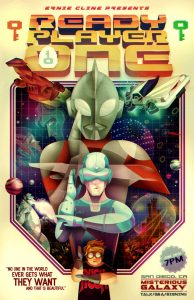Canon can be defined as more than just literary but possibly it’s polar opposite of non-literary media. Gasp! How could I say such a thing as that as a scholar of literature? For Jonathan Culler, author of Literary Theory: A Very Short Introduction, there is a considerable debate between literary and non-literary canon. A definition from the Oxford English Dictionary dated from 2002 suggests it is a, “A body of literary works traditionally regarded as the most important, significant, and worthy of study”, but I find this definition only correct as far as “body of literary works”, while the rest presumes too much. I say literary canon is now on-track to fuse with popular canon, as I look at an entertaining read in Ready Player One (2011) a novel by Ernest Cline. The first few chapters can be found online. The science fiction story focuses on a virtual reality contest in 2044 based around a teen’s 1980’s-inspired scavenger hunt that describes popular culture as it’s own shared consciousness canon. What all three can agree on is that the definition of literary canon is going to need to expand though they need to also include non-literary popular culture multimedia formats.

Jonathan Culler believes that literary canon may be endangered to its diametrically opposed popular culture non-literary canon counterparts, but can still be seen equal rivals. While cultural studies may be “all encompassing”, literary canon has an exclusive division of quality. I can relate to his argument that some works in the literary canon have also eclipsed the more ‘minor’ works compared to larger works such as Shakespeare’s plays. Culler summarizes that the two canons may not need to compete, in that, “close reading of non-literary does not imply aesthetic valuation of the object,” a statement that holds true in the enjoyment of Ready Player One.(Culler, 55) If anything, I happen to agree with Culler’s analysis of the binary.

In Ready Player One, the main character Wade Watts competes in a videogame-based scavenger hunt designed in a canon of popular culture references from the 1980’s, which in itself is a kind of commentary on canon. After the death of James Halliday, founder of the first total virtual reality experience, a post-mortem online video challenges the world to follow his challenge in order to secure his inheritance. As a result, “The Hunt, as the contest came to be known, quickly wove its way into global culture.”(Cline, 7) In a way, a popular culture canon is a kind of contest in which we put effort into committing works to memory as a kind of trivia. The global aspect is also fascinating, in that popular culture has permeated more global spheres than traditional literature. Thus, “Fifty years after the decade had ended, the movies, music, games, and fashion of the 1980’s were all the rage again.”(Cline, 7) This obsession with the 1980’s mirrors realities obsession with deciphering Shakespeare’s plays and historical background. The Bard, while rough 400 years old, has the same affect on our world as Halliday in Cline’s. As the contest continues, movies and music references abound. Cline’s fiction novel reads like a love letter to a bygone popular culture canon filled with Matthew Broderick and Harrison Ford films alongside Wham! And Rush. While very little of the references are tradition literary text in format, the new media and the spirit of canon remains.
In honesty, I fill this blog post may have taken too many liberties with canon as a concept in literary theory. The definition from the OED would find my close reading of Ready Player One a misuse of the word, but I insist that canon’s definition is not broad enough. To only suggest the most academic works deserve canonization is a disservice to the potential of new minor works in the future. Like Culler either side of this debate has a legitimate point.